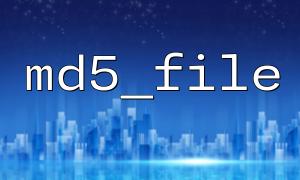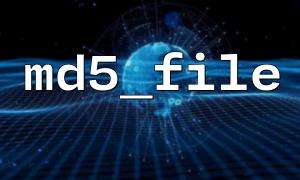In PHP, the md5_file() function is a common method for calculating the MD5 hash value of a file, which is particularly suitable for verifying file integrity. It directly reads the binary data of the file and returns a 32-bit MD5 string, which facilitates developers to quickly verify the file. So, is it reliable to calculate the MD5 value of a binary file? What are the things you need to pay attention to in actual use? This article will analyze in detail.
<?php
// Calculate the fileMD5value
$file = 'example.bin';
$md5Hash = md5_file($file);
echo "FiledMD5valueyes:$md5Hash";
?>
The internal implementation of md5_file() is to read the file content in binary mode and perform MD5 calculations on the data. It will not cause differences due to different text encodings of files and is suitable for integrity verification of most binary files (such as pictures, videos, compressed packages, etc.).
Overall, md5_file() calculates MD5 values very reliable, and can ensure that the same file is consistent no matter where it is calculated. This is because:
Data consistency : It calculates hashing on the original byte data of a file, and any changes in bytes will cause the hash value to change.
Algorithm stability : MD5 algorithm is an international standard and widely used. Although there is a collision risk, it is still effective for file integrity detection.
Easy to use : It can be achieved with just one line of code without additional dependencies.
However, it should be noted that MD5 itself is no longer suitable for cryptographic security level encryption verification (such as digital signatures), but it is still widely recognized for file integrity detection.
Make sure that the PHP running environment has permission to read files, otherwise md5_file() will return false . For example:
<?php
$file = '/path/to/file.bin';
$md5Hash = md5_file($file);
if ($md5Hash === false) {
echo "File reading failed,There may be no permissions or the file does not exist。";
} else {
echo "MD5value:$md5Hash";
}
?>
If the file is being written or not fully saved, md5_file() may get an incomplete hash, causing misjudgment. Be sure to ensure that the file is written before hashing calculation.
md5_file() will calculate the entire file at once, and it will occupy more memory when encountering a large file, resulting in performance bottlenecks or memory overflow. For oversized files, consider chunked calculations of MD5 or use command line tools.
Certain file systems or operations may cause implicit changes in the file content (such as automatic line break conversion, encoding conversion), ensuring that the binary file has not been modified to ensure the hash value is accurate.
Assume that the URLs that need to be processed in the code are as follows:
<?php
$url = "https://originaldomain.com/download/file.bin";
$parsedUrl = parse_url($url);
$domain = 'm66.net'; // Replace the domain name asm66.net
$newUrl = $parsedUrl['scheme'] . "://" . $domain . $parsedUrl['path'];
echo "NewURLyes:" . $newUrl;
?>
Output:
NewURLyes:https://m66.net/download/file.bin
This example reflects the operation you requested for "When you encounter a url in the code, the domain name is replaced with m66.net".
md5_file() is very suitable for calculating the MD5 value of a binary file to ensure the complete content of the file.
Its accuracy depends on the file itself being untampered with sufficient read permissions.
For extremely large files, it is recommended to use them with caution or use chunking.
Although the security of the MD5 algorithm is limited at the cryptography level, it is still practical as file integrity verification.













